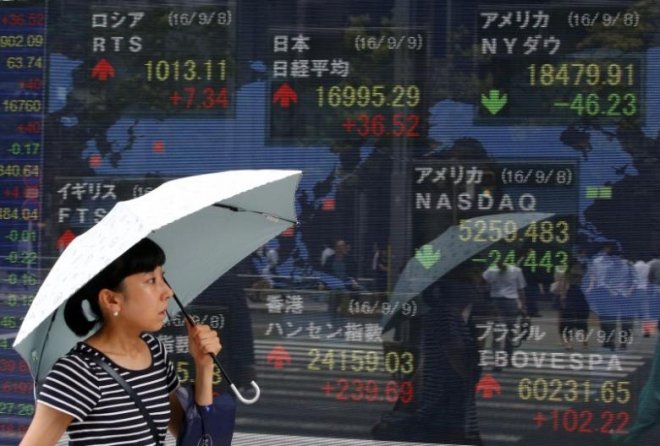
Asian share indices continued to slide on Tuesday (Jan 31), led by Japan's Nikkei and Singapore's STI, amid concerns Trump's policies will continue to fuel geopolitical tensions and keep aside growth agenda in the world's largest economy.
The Nikkei225 traded 1.33% down and STI down 0.99% at 10:55 am Singapore time while Malaysia's KLSE fell 0.7% and South Korea's KS11 dropped 0.5%.
The US dollar weakened broadly also helping a continued gold rally reflecting the risk aversion sentiment in financial markets. The yellow metal traded at $1202/ounce, up 0.5% on the day. Silver, platinum and palladium also were up on the day.
Against the Singapore dollar, the greenback fell to 1.41880 from the previous close of 1.42073, adding to the local dollar's 0.8% gain in the previous session.
The yen, euro and the pound continued Monday's upward move versus the US currency. USD/JPY slipped to 113.45 from 113.72, EUR/USD edged higher to 1.07100 from 1.06202 and GBP/USD up to 1.25175 from 1.24839.
The Bank of Japan left key interest rates unchanged at the policy review on Tuesday but decided to purchase exchange-traded funds (ETFs) and Japan real estate investment trusts (J-REITs) so that their amounts outstanding will increase at an annual paces of about 6.0 trillion yen (S$750 billion) and about 90 billion yen, respectively.
With regard to the amount of JGBs to be purchased, the BoJ will conduct buying at more or less the current pace -- an annual pace of increase of about 80 trillion yen, the central bank said.
Asian shares also took the lead of the U.S. stock indices that fell the most since the November election, on worries Donald Trump may follow through with isolationist policies.
Markets are now waiting for the Feb 1 Federal Reserve policy statement for clues as to how the central bank is assessing the macro picture of he United States in the backdrop of the new government's policies.
Crude prices were little changed after two days of declines as drilling in the US rose to the highest in more than a year, countering Opec's efforts to clear a supply glut. The WTI crude was trading at $52.65 a barrel, after losing 1% on Monday, capping a second straight day of losses.
Chinese and Hong Kong markets are shut for Chinese New Year holidays.








